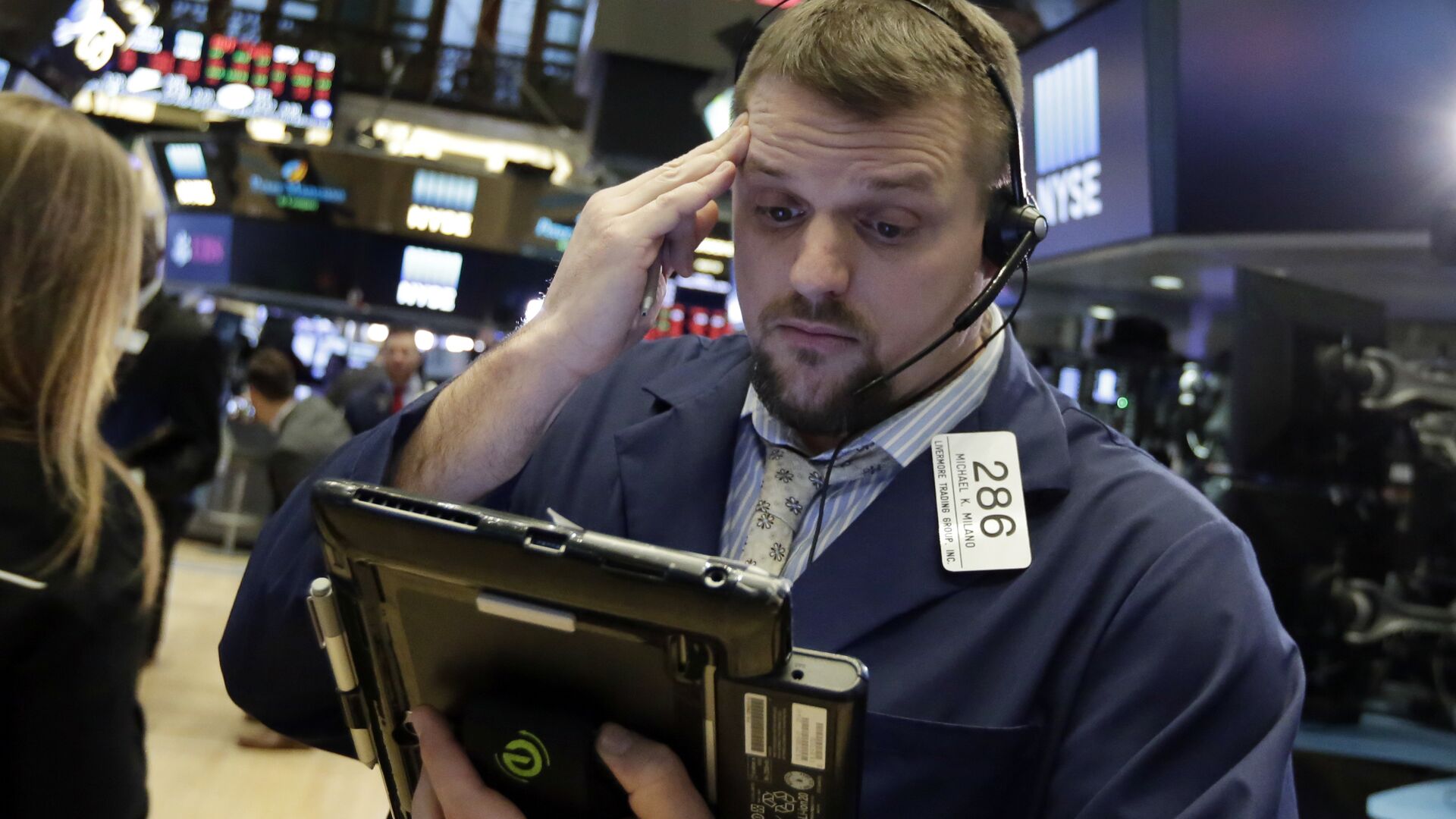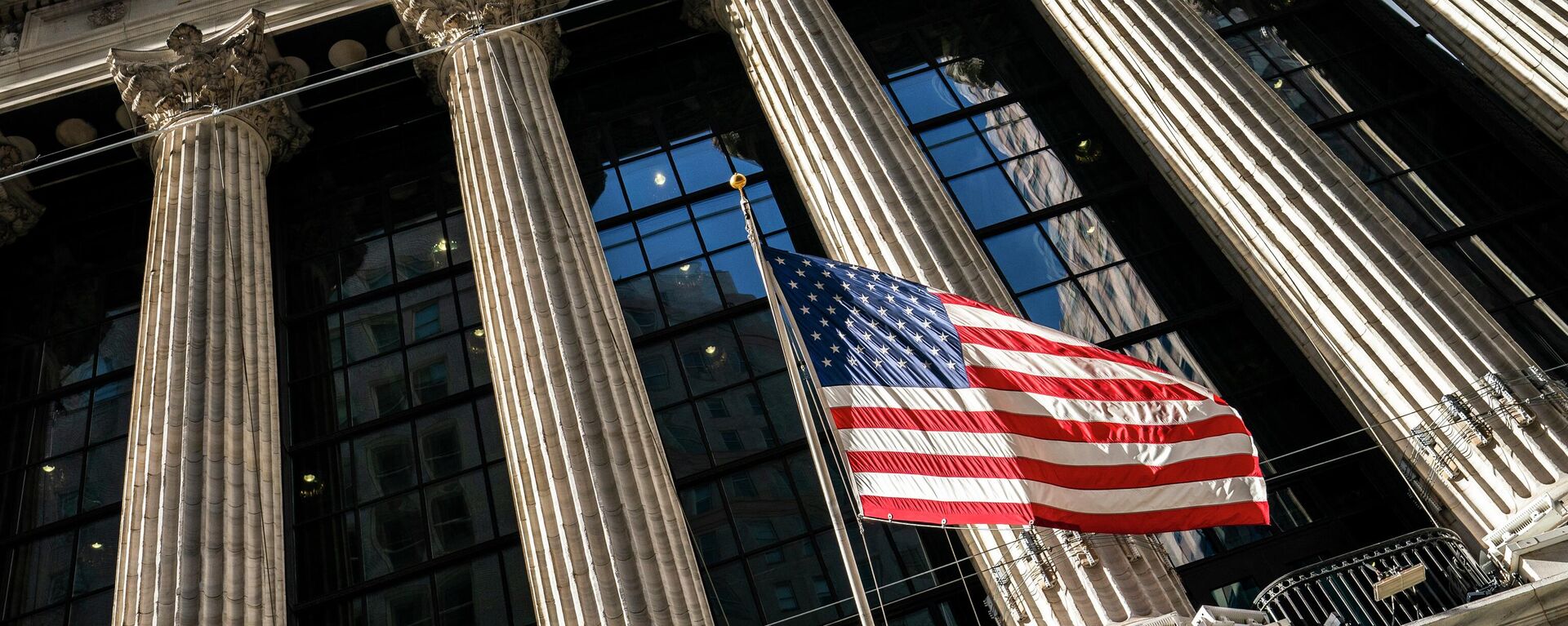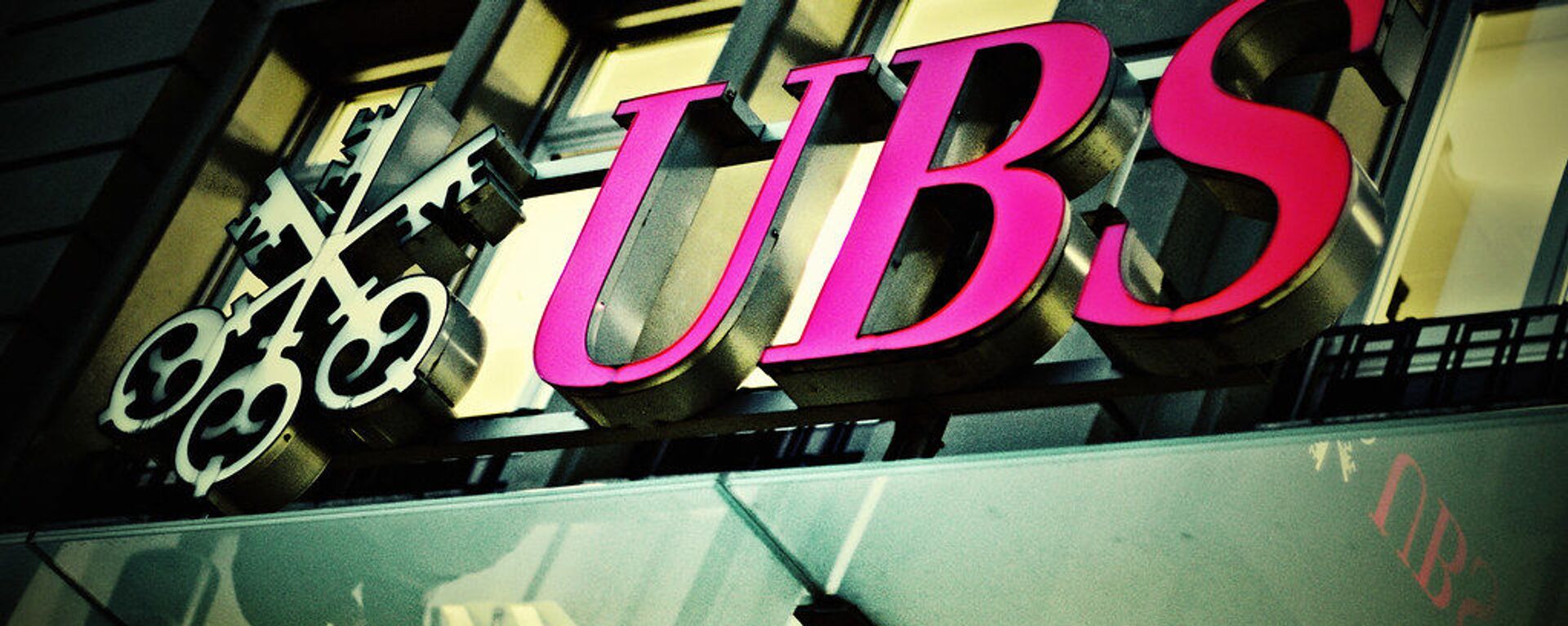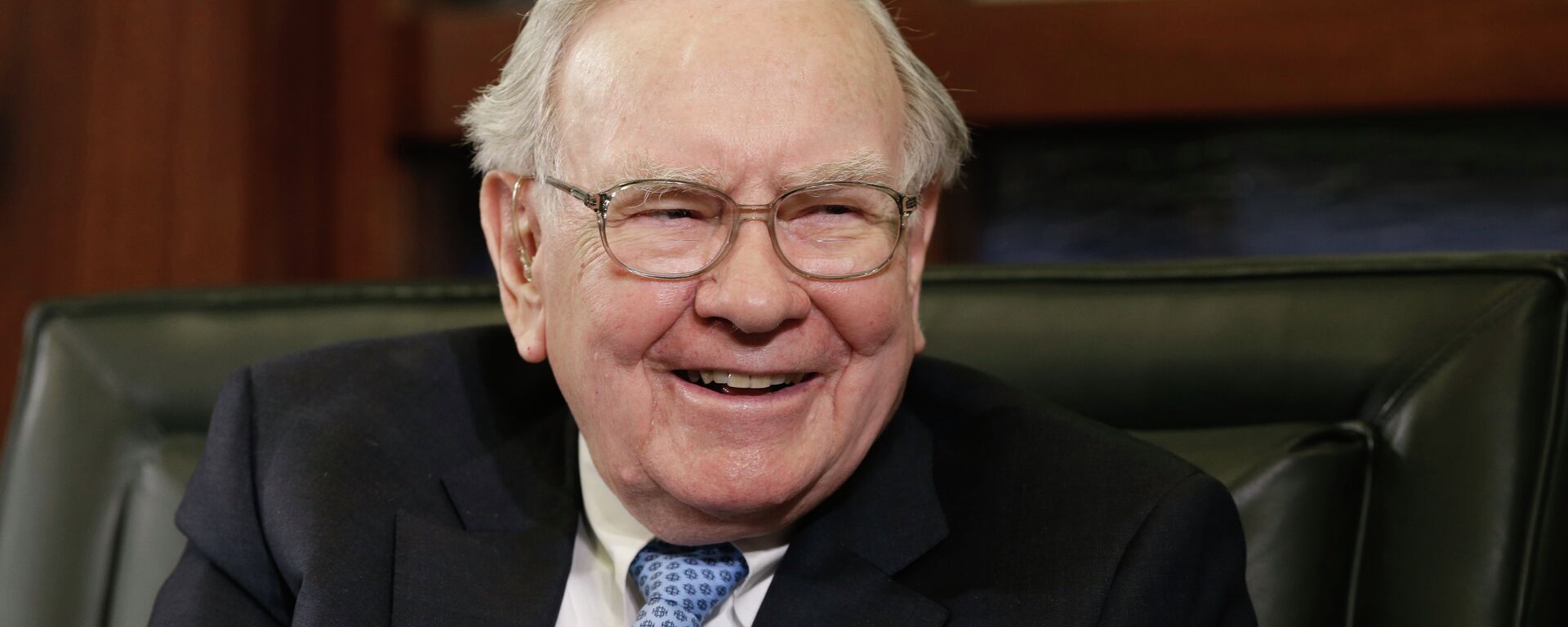https://sputnikglobe.com/20230321/why-the-banking-crisis-is-just-gaining-steam-with-the-global-economy-in-uncharted-waters-1108647804.html
Why the Banking Crisis is Just Gaining Steam With the Global Economy in Uncharted Waters
Why the Banking Crisis is Just Gaining Steam With the Global Economy in Uncharted Waters
Sputnik International
The Federal Reserve is expected to increase current interest rates by one-quarter of a percentage point. The Fed's forthcoming decision is raising questions as... 21.03.2023, Sputnik International
2023-03-21T15:11+0000
2023-03-21T15:11+0000
2023-03-21T15:11+0000
economy
us
recession
inflation
2008 financial crisis
credit suisse group ag
ubs
silicon valley bank
silicon valley bank collapse
us federal reserve
https://cdn1.img.sputnikglobe.com/img/106314/88/1063148898_0:300:5760:3540_1920x0_80_0_0_a28ac0457bc7048430910400fdd77612.jpg
The US federal takeover of Silicon Valley Bank and Signature Bank, and the Credit Suisse merger with UBS has not calmed markets so far, according to the Western press. Banks around the world reportedly face falling customer deposits and losses on holding securities.Financial experts predict an economic slowdown and growing recession risks. Some say that the unfolding banking crisis is largely prompted by the Federal Reserve's aggressive interest rate hikes and project that the US central banking system may cut rates in September 2023 to avert recession. Others suggest that the banking crisis has long been in the making and is caused by the failure of an economic structure built upon artificially cheap money.Meanwhile, global investors remain unnerved after the Swiss regulator stipulated almost $17 billion of the lender's Additional Tier 1 (AT1) debt to be written down to zero, as part of the Credit Suisse rescue deal. Thus, Credit Suisse's bondholders lost their investments, while the lender's shareholders will at least receive payouts as part of the takeover. Eventually, UBS and Credit Suisse's shares fell on March 20 in the aftermath of the hasty rescue deal. Some Western media have raised the question of whether the Swiss government's tough moves will become a modus operandi for other countries struck by the banking crisis.Another big event this week will be the decision by the Fed on new interest rate hikes. Earlier, the Federal Reserve, the European Central Bank, the Bank of England, the Swiss National Bank, the Bank of Canada and the Bank of Japan kicked off a set of measures to ensure seamless funding for global financial institutions to ease tensions over the collapse of the US and European banks. The coordinated move was seen by many as a step toward pausing rate hikes which threaten to further rock the financial boat.Fed's New Rate Hikes May Exaggerate Banking CrisisHowever, some observers argue that the Fed's decision to continue an aggressive fight against inflation would be as bad as putting it on hold.So far, the US central banking system has raised rates eight times, from just 0.25% in early 2022 to 4.75% in February 2023. This has become the fastest pace of rate increases since the early 1980s.If the Fed lifts interest rates by more than 0.25 percentage points on Wednesday, it could prompt further anxiety in the financial market, international observers suggest.Speaking to Sputnik last week, Dr. Paul Craig Roberts, an American economist and author who was assistant secretary of the Treasury during the Reagan administration, warned: "the Federal Reserve's policy of raising interest rates (…) causes existing financial assets on banks' balance sheets to decline in value. If the Federal Reserve doesn't cease raising interest rates, more banks will be pushed into insolvency."What's more, the Fed's approach is flawed, as per the American economist: "Inflation will have to be brought under control with supply-side, not demand-side policy," Dr. Roberts argued, explaining that instead of being caused by "too much money", the unfolding inflation in the US is prompted by "an insufficiency of supply."Thus, theoretically, the unfolding inflation could have been reduced by fixing supply chains, lifting restrictions on business relationships and bringing US jobs back home. However, given the latest announcement of a new package of military aid for Kiev and inflammatory rhetoric towards China, the Biden administration is not inclined to make it any easier for the global markets and the US economy, in particular.On top of that, a Wall Street heavyweight, J.P. Morgan, warned last Wednesday that the Fed's tighter monetary policy and concerns over the simmering banking crisis could push the US into recession later this year. "A very rough estimate is that slower loan growth by mid-size banks could subtract a half to a full percentage-point off the level of GDP over the next year or two," the financial institution wrote in its statement.Putting Rate Hikes on Hold May Send Wrong SignalMeanwhile, as inflation is continuing to bite the US economy (and there are zero signs that the West is eager to fix destroyed supply chains) Western observers warn that if the Fed decides to push the pause button on the rate hikes, inflation may spiral out of control.Inflation has been hitting the US economy since 2021, with prices for homes, cars, food, energy and many more rising for American consumers. In addition, it is increasingly eating away at both wages and the value of the people's savings.There is yet another tricky thing about the Fed's possible decision to stop rising rates or to raise them at a considerably lower pace: instead of calming the markets down, it could exaggerate fears, according to some experts. If the Federal Reserve and other central banks show that they are really concerned with the collapse of the US and European banks, investors may think that it is a signal of serious trouble and that the things are even worse than they previously imagined.Even though US and European officials are asserting to the public that what is going on is by no means the repetition of the 2008 global financial crisis, the global economy appears to find itself in uncharted waters.
https://sputnikglobe.com/20230317/recession-insolvency-derivative-risks-why-looming-us-crisis-could-be-worse-than-in-2008-1108517439.html
https://sputnikglobe.com/20230320/what-happened-with-credit-suisse-and-why-is-ubs-buying-it-1108613201.html
https://sputnikglobe.com/20230319/warren-buffett-advising-white-house-on-banking-dumpster-fire-as-economists-compare-it-to-2008-1108576804.html
Sputnik International
feedback@sputniknews.com
+74956456601
MIA „Rossiya Segodnya“
2023
News
en_EN
Sputnik International
feedback@sputniknews.com
+74956456601
MIA „Rossiya Segodnya“
Sputnik International
feedback@sputniknews.com
+74956456601
MIA „Rossiya Segodnya“
us federal reserve meeting, us federal reserve's rate hikes, us banking crisis, european banking crisis, svb collapse, domino effect, banking crisis contagion, us recession, us inflation, soft landing, soaring food and energy prices
us federal reserve meeting, us federal reserve's rate hikes, us banking crisis, european banking crisis, svb collapse, domino effect, banking crisis contagion, us recession, us inflation, soft landing, soaring food and energy prices
Why the Banking Crisis is Just Gaining Steam With the Global Economy in Uncharted Waters
The Federal Reserve is expected to increase current interest rates by one-quarter of a percentage point. The Fed's forthcoming decision is raising questions as the banking crisis appears to be far from over, despite stabilization measures being taken by the US and Swiss governments.
The US federal takeover of Silicon Valley Bank and Signature Bank, and the Credit Suisse merger with UBS has not calmed markets so far, according to the Western press. Banks around the world reportedly face falling customer deposits and losses on holding securities.
Financial experts predict an economic slowdown and growing recession risks. Some say that the unfolding banking crisis is largely prompted by the Federal Reserve's aggressive interest rate hikes and project that the US central banking system may cut rates in September 2023 to avert recession. Others suggest that the banking crisis has long been in the making and is caused by the failure of an economic structure built upon artificially cheap money.
"The US economy is a mess because of years of zero-bound rates," Tom Luongo, a financial and political commentator, told Sputnik in June 2022.
Meanwhile, global investors remain unnerved after the Swiss regulator stipulated almost $17 billion of the lender's Additional Tier 1 (AT1) debt to be written down to zero, as part of the Credit Suisse rescue deal. Thus, Credit Suisse's bondholders lost their investments, while the lender's shareholders will at least receive payouts as part of the takeover. Eventually, UBS and Credit Suisse's shares fell on March 20 in the aftermath of the hasty rescue deal. Some Western media have raised the question of whether the Swiss government's tough moves will become a modus operandi for other countries struck by the banking crisis.
Another big event this week will be the decision by the Fed on new interest rate hikes. Earlier, the Federal Reserve, the European Central Bank, the Bank of England, the Swiss National Bank, the Bank of Canada and the Bank of Japan kicked off a set of measures to ensure seamless funding for global financial institutions to ease tensions over the collapse of the US and European banks. The coordinated move was seen by many as a step toward pausing rate hikes which threaten to further rock the financial boat.
Fed's New Rate Hikes May Exaggerate Banking Crisis
However, some observers argue that the Fed's decision to continue an aggressive fight against inflation would be as bad as putting it on hold.
So far, the US central banking system has raised rates eight times, from just 0.25% in early 2022 to 4.75% in February 2023. This has become the fastest pace of rate increases since the early 1980s.
If the Fed lifts interest rates by more than 0.25 percentage points on Wednesday, it could prompt further anxiety in the financial market, international observers suggest.
Speaking to Sputnik last week, Dr. Paul Craig Roberts, an American economist and author who was assistant secretary of the Treasury during the Reagan administration, warned:
"the Federal Reserve's policy of raising interest rates (…) causes existing financial assets on banks' balance sheets to decline in value. If the Federal Reserve doesn't cease raising interest rates, more banks will be pushed into insolvency." What's more, the Fed's approach is flawed, as per the American economist: "Inflation will have to be brought under control with supply-side, not demand-side policy," Dr. Roberts argued, explaining that instead of being caused by "too much money", the unfolding inflation in the US is prompted by "an insufficiency of supply."
"Two major events have reduced supply relative to demand," Dr. Roberts explained to Sputnik back in June 2022. "The Biden regime's COVID lockdowns stopped much production, destroyed supply chains, and resulted in the permanent closing of many businesses. On top of this supply reduction, the Biden regime's sanctions against Russia and the world further reduced supply by prohibiting existing business relationships. Thus, supply has had two major reductions. Moreover, higher interest rates themselves raise costs, thus further restricting supply."
Thus, theoretically, the unfolding inflation could have been reduced by fixing supply chains, lifting restrictions on business relationships and bringing US jobs back home. However, given the latest announcement of a new package of military aid for Kiev and inflammatory rhetoric towards China, the Biden administration is not inclined to make it any easier for the global markets and the US economy, in particular.
On top of that, a Wall Street heavyweight, J.P. Morgan, warned last Wednesday that the Fed's tighter monetary policy and concerns over the simmering banking crisis could push the US into recession later this year. "A very rough estimate is that slower loan growth by mid-size banks could subtract a half to a full percentage-point off the level of GDP over the next year or two," the financial institution wrote in its statement.
Putting Rate Hikes on Hold May Send Wrong Signal
Meanwhile, as inflation is continuing to bite the US economy (and there are zero signs that the West is eager to fix destroyed supply chains) Western observers warn that if the Fed decides to push the pause button on the rate hikes, inflation may spiral out of control.
Inflation has been hitting the US economy since 2021, with prices for homes, cars, food, energy and many more rising for American consumers. In addition, it is increasingly eating away at both wages and the value of the people's savings.
There is yet another tricky thing about the Fed's possible decision to stop rising rates or to raise them at a considerably lower pace: instead of calming the markets down, it could exaggerate fears, according to some experts. If the Federal Reserve and other central banks show that they are really concerned with the collapse of the US and European banks, investors may think that it is a signal of serious trouble and that the things are even worse than they previously imagined.
Even though US and European officials are asserting to the public that what is going on is by no means the repetition of the 2008 global financial crisis, the global economy appears to find itself in uncharted waters.





